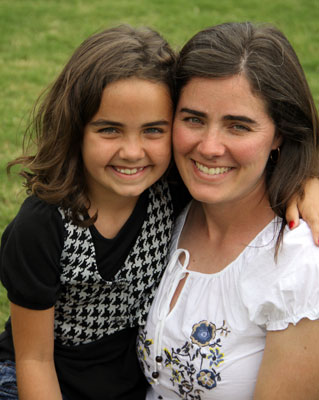
Modeling as Lifestyle
Ever wanted to be a model? You are one!
Watkins's ideas about some of the modeling we do for our children.
Children learn, of course, from what we tell them, but so much more often, and more effectively, from how we act.
I am sometimes asked how best to react when a child complains of vague and essentially non-worrisome complaints. Almost every parent hears these from time to time: stomach aches, leg pains, headaches, annoying itches or feelings of dizziness or light-headedness. All these complaints might be signs of serious illness, but more often they aren't and most of the time parents know this. Sometimes it's about school starting or there's pressure about a game or a trip. Perhaps the complaint is a copy of one that the child witnessed from a sibling, a friend or an adult. I'm not suggesting that such complaints be ignored out-of-hand, but there are plenty of times that parents will feel confident that there is not anything seriously wrong, or strongly suspect so, and they want to be sympathetic without reinforcing the perceived malady.
At these times, and some others, I suggest modeling a response that demonstrates how we ourselves usually behave when we have a pain, ache or funny feeling. We listen to ourselves, we do something practical and safe to see if it helps and then we go on about our business. Sometimes a pain is like a smoke alarm and we shouldn't ignore it, but more often it's more like the neighbor's annoying car alarm, something we check on, remedy if we can, then ignore and move on.
When I was grade school aged, my legs would hurt at night when I was waiting in bed to go to sleep. I would complain (a lot, as I felt surely neglected as the third of four children) and my mom would come to my room in response to my complaints. She'd look me over, kiss my forehead and say something like, "Gee, I'll bet your legs really hurt. You know if you go to sleep, I think you won't feel it. Night, night - I'll be back to check on you in a while." Of course, I never managed to stay awake long enough to see if she really came back.
What she didn't say was, "quit your whining, your legs don't really hurt. Go to sleep." If she had, I'm sure I would have argued with her and exaggerated the pain, just to get sympathy. And she never said anything like, "MY POOR BABY! This could be serious. Tell me more. Is it really, really bad?" She acknowledged my discomfort as real, made a helpful suggestion and then went about her business.
Similarly when I had stomach aches (in retrospect probably lactose intolerance that revealed itself full-blown when I was in my twenties), she'd say. "Hmmm. Maybe you should try going to the bathroom. Or you could lie down for a while, that sometimes helps when I have stomach ache." And then she'd go about doing whatever it was she was always doing (like cooking 20 meals a week in our restaurant-free town.) She would acknowledge, suggest, and then move on.
I think she was watching to see what I did after these replies. I suppose if I had lain writhing and forlorn on my bed for hours she might have sought medical advice, but as it turned out, and as it usually turns out, my pains were fleeting and not the sign of some serious underlying disorder. I survived.
And I learned a bit of a lesson. When something bothers you, a good plan of action is to think about it, do what seems proportionate and practical and then proceed with the tasks at hand. This has served me well and something that I hope my own children have adopted.
As a disclaimer I should say that this is not meant to say that pains, aches, or other, even ill-defined complaints should be routinely ignored. But even if something worries you, it's not a bad thing to model this kind of response for your child. There is no point in transferring your own anxiety to your child. You may want to record the pains, to gently inquire about their frequency, severity, or your child's own concerns - perhaps best done when the pain is not present. And you may, very justifiably, choose to have a doctor visit to make sure nothing is missed.
In the meantime, however, demonstrate the kind of reasonable response that most psychologically healthy adults would use for themselves. Be a model.


